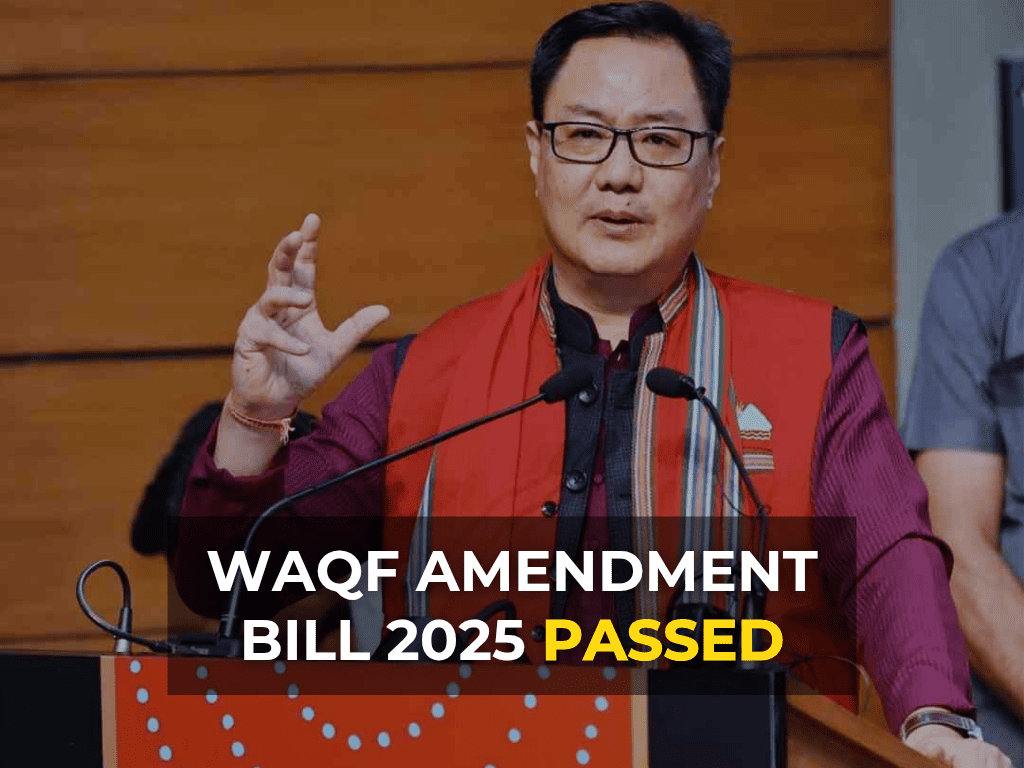Waqf Amendment Bill 2025 Passed in the Lok Sabha

The revised Waqf Amendment Bill has finally been passed in the Lok Sabha after a series of prolonged debates and discussions that lasted around 12 hours on 3 April 2025 at around 02:08 AM. The bill was introduced in the House by Kiren Rijiju, the Minister of Minority Affairs and Minister of Parliamentary Affairs, on April 2, 2025.
The Waqf Amendment Bill was initially presented in 2024 but faced opposition, leading to the formation of a Joint Parliamentary Committee (JPC) to review the proposed changes. After thorough scrutiny, a total of 14 new amendments were finalized, and the revised Waqf Amendment Bill was subsequently reintroduced in Parliament for discussion and voting.
After the voting process, the bill was successfully passed because allies of BJP – the Janata Dal (United) [JDU] and the Telugu Desam Party [TDP] extended their support, securing a majority. A total of 288 votes were in favour of the Waqf Amendment Bill and 232 votes were against the Waqf Amendment Bill.
Here’s the brief overview of what the revised bill proposes and why was it needed in the first place.
Table of Contents
Why the Waqf Act needed amendments?
The Waqf Board was established as a result of the Waqf Act 1954 which was later amended in 1995. The Waqf Act 1995 introduced many provisions that significantly expanded the powers of the Waqf Board, leading to concerns over unchecked authority.
One of the most controversial provisions was that if the Waqf Board claimed a property as Waqf, the affected party could not challenge the decision in a civil court. Instead, they were required to approach a Waqf Tribunal. This was misused by the Waqf Board to arbitrarily claim any property as theirs.
Over the years, the Waqf Board has grown tremendously. It is the third-largest land-owning entity in India, after the Indian Army and the Railways. Many accused the Waqf board of operating without accountability, often making arbitrary claims on properties and corruption charges. Due to these issues, there was a need for reforms in Waqf laws, which eventually led to the amendments proposed in the Waqf Amendment Bill 2024-25.
Highlights of the Waqf Amendment Bill 2024-25
After scrutiny, some initial amendments from the Waqf Amendment Bill 2024 were removed from the revised bill to address the issues. It also includes recommendations from the Joint Parliamentary Committee (JPC) while addressing concerns about transparency, property management, and legal disputes.
The revised Waqf Amendment Bill, passed in the Lok Sabha on April 2, 2025, brings major reforms to the administration of Waqf properties in India which are as follows:
(1) The revised Waqf Amendment bill removes Section 107 of the Waqf Act, 1995, which previously made the Limitation Act, 1963, inapplicable to Waqf properties. As a result, Waqf Boards will now have a 12-year limit to reclaim encroached properties, just like any other property owner. This move was important to increase uniformity across all the institutions and private property owners in the country.
(2) All the properties under the Waqf Board must be registered on a centralised online portal within six months of the law’s enactment. Also, any new properties or assets can only be registered through this portal for better tracking and transparency.
(3) A new eligibility rule has been devised for creating a Waqf property. The person who wants to donate his/her property to Waqf Board must prove that he or she has been practicing Islam for at least 5 years.
(4) The “Waqf by User” Doctrine was meant to be removed through the initial Waqf Amendment Bill 2024 but according to the revised bill it will still be applicable.
According to this doctrine, the property which has been used for religious purposes over generation can be claimed as Waqf property without formal documentation.
However, the revised bill states that only the properties which were already registered as Waqf property before the enactment of the law will retain their status.
(5) A major change is that now, a non-Muslim can also be appointed as the Chief Executive Officer (CEO) of a Waqf Board. Also, each State Waqf Board must have at least two non-Muslim members.
Now, the government can also select non-muslims for appointing three Members of Parliament (2 Lok Sabha MPs & 1 Rajya Sabha MP) to the Central Waqf Council.
So, in conclusion the revised bill allows non-Muslims to be a part of important Waqf bodies, such as the Central Waqf Council, State Waqf Boards, and the Waqf Tribunals.
(6) There has been a significant change in the process of the Waqf Surveys where prior to this amendment, district collectors were appointed for Waqf surveys. But now only senior officers can be given the task of Waqf Surveys.
Moreover, a property cannot be claimed as Waqf property until the senior level officer submits his/her final report in their favour. The designated officer will have a final say in the ownership of the property. Previously, the decision of the Waqf tribunals was considered final.
(7) Now, according to the revised bill, any legal matters related to Waqf property rights can only be filed in court if the property was registered as Waqf property within six months of the law being implemented. In case of no prior registration, the courts will not accept the case. However, there is a provision that if the board can give a valid reason for delay in registration then the court might take up the case.
All these new amendments ensure that there is a level of transparency maintained and it also prevents the Waqf board from misusing its powers to claim over unregistered property.
Overall, it is evident that the government is trying to bring uniformity and prevent unnecessary legal disputes. Additionally, the digitization of the Waqf properties is a great initiative for better management.
Conclusion
The revised Waqf Amendment Bill 2025 has been passed in the Lok Sabha, but it must also secure approval in the Rajya Sabha before it can become law.
Once cleared by the Rajya Sabha, it will require the President’s approval to finally come into force officially.
Make sure you subscribe to our website for in-depth information about the recent updates and news. Thank you for taking your time to read this article.
LittiChokha is one of the leading News & Media company based in Patna, Bihar. We make sure the news we provide is authentic and has undergone multiple Fact-Checks.





